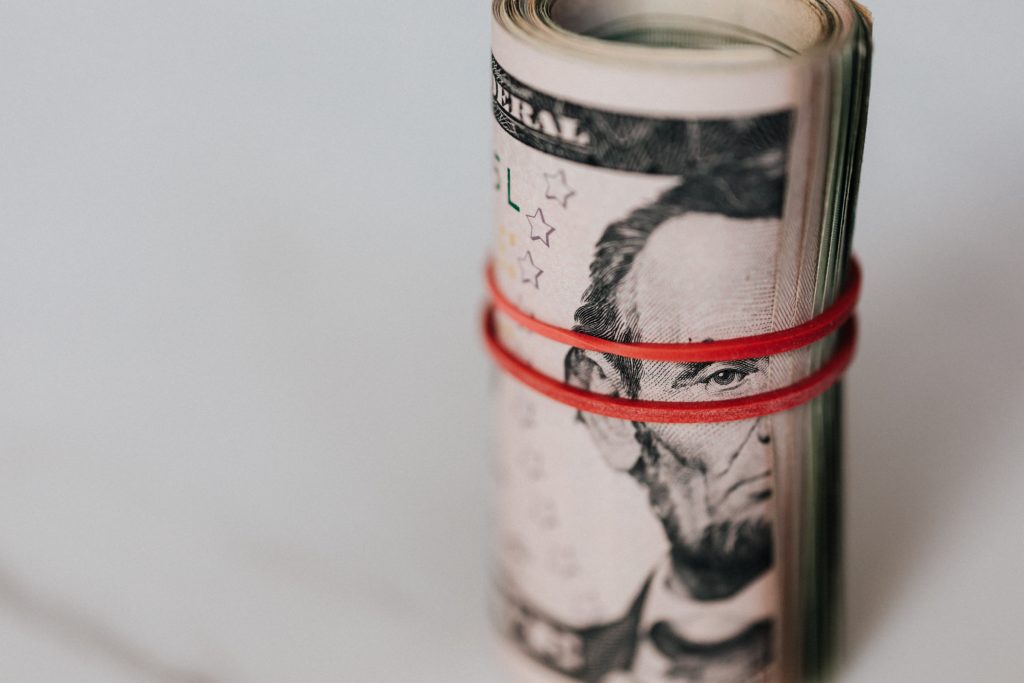Gold, cash, and bonds are traditional vehicles to hedge against a recession. Cryptocurrencies have not been around during past recessions, but due to their decentralized nature, they could turn out to be an excellent tool for recession hedging. Right now, inflation is on most peoples’ minds but many experts are talking about a recession being a real possibility as a result of the Federal Reserve’s interest rate battle to bring inflation under control.
Inflation and recession are opposing economic forces. Inflation is when too much money is flowing through the economy and chasing too few products/services (money causes high demand, and products/services are in low supply). A recession is a fall in the Gross Domestic Product (Real GDP) of the economy. Key characteristics of a recession are rising unemployment levels and assets falling in price (low demand from lack of employment results in over-supply of assets).
The Fed interest rate hikes will make it more expensive for businesses and consumers to borrow money in the hopes that it will reduce consumer demand and push asset prices lower. It is estimated that today’s tumbling stock values are the result of Wall Street pricing in a recession sometime in the next 12 to 18 months. The Fed is walking a tightrope. If the Fed gets it right, the economy will slow just enough to bring down inflation, but not so much that it tips the economy into a recession.
A hedge against a recession, before it happens, can be the right time to rebalance your portfolio without panicking. Recessions don’t last forever and are typically followed by a period of robust growth. The Great Recession lasted 18 months. It was followed by the longest economic expansion in U.S. history.
Bitcoin as a Hedge Against a Recession
So far, Bitcoin and other cryptocurrencies have not lived up to their billing as a hedge against inflation. On the other hand, today’s low investment prices could become a bonanza in the not distant future.
Admittedly, as far as being a hedge against a recession, Bitcoin and other cryptocurrencies are the riskiest – as in risk and reward. The main reason is that Bitcoin has never been tested (proved or disproved) during a recession. What Bitcoin has going for it is that it is a decentralized currency.
Over the past few years, cryptocurrencies have exploded in popularity and value. During 2021 and into 2022, the cryptocurrency market grew to more than $3 trillion in value — more than quadruple what it was worth in 2020. The crypto community fantasizes of an economy free of the politicians and financiers whose actions led to the 2008 fiscal crisis. After all, Bitcoin’s founder Nakamoto released his paper outlining how Bitcoin would work in 2008 just as the U.S. government was bailing out big banks. Bitcoin is a system where transactions are recorded by the community on databases on many different computers and users can keep track of one another to make sure no one is tampering with the system.
Bitcoin, with its cap of 21 million tokens, is all but guaranteed to become scarcer relative to fiat currencies. “The demand for a hard money asset only exists when growth is low (recession), liquidity is capped (assets difficult to sell quickly for a good price), and purchasing power is a struggle to maintain (unemployment). That time has yet to come. Bitcoin may soon shine brightly once again as a hedge against a recession.
A Recession Blocked and Chained
Another side is that Bitcoin and cryptocurrencies are closely correlated with technology via blockchains. Many speculate that greater widespread adoption will broaden Bitcoin’s appeal.

Already, the potential of Bitcoin’s value both financially and in payment systems has gathered worldwide momentum. Right now, cryptocurrencies are being tested for the first time during a time of inflation. It may soon also be tested through a recessionary stage. The reward would be that momentum rebuilds and easily surpasses its previous highs.
Recessions come and go, and some are worse than others. Those in the technology sector that perform the best use a recession to find ways to thrive and prepare to grow after the recession ends. There was great speculation of a worldwide recession as the result of the COVID-19 pandemic. What the technology sector saw is people turning to video conferencing and online collaborative tools to work from home.
Recession in the Tech Industry
Although the tech industry is not immune to a recession, it is in a much better place to weather the crisis than the travel industry. We’ll see the need for more technology, not less, to help us get through this challenging time in our history. Along with the evolution of crypto is the transformational technology related to 5G. Many see 5G as the heart of the next decade’s tech boom, along with virtual reality. Technology has a strong role as a hedge against a recession.
However, not all tech companies come out stronger after a recession. Some may not even survive. The Dot-com bust of 1999-2000, for example, was a tough one for tech, but in the end, it weeded out the technologies with bad business models. Others saw a strong rebound with new and innovative technologies driving future demand.
What About Bitcoin Volatility?

Bitcoin has historically been highly volatile, moving rapidly, (up and down), with changes in sentiment and regulatory approaches by leaders and nations. The true evolution of crypto can only be proven when the future arrives. However, today we know that theoretically, it makes little sense that a currency whose supply cannot be adjusted would ever be stable. Demand for the currency moves up and down, so its price will change unless the supply is adjusted as well. The history of traditional currencies underscores that point. The cryptocurrencies least likely to emerge as a hedge against a recession are those pegged to a fiat currency, such as the U.S. Dollar.
If or when we have a recession, and once we come out of it, Bitcoin may prove to be a strong hedge against a recession. It is perhaps that Bitcoin’s relative infancy, in tandem with its volatility and questions of its inherent value has left some experts skeptical. The central question of whether it still has the opportunity to develop as a recession hedge with the same reputation as gold remains open. For now, the jury remains undecided.
Gold as a Hedge Against a Recession
There have been eight stock market declines in the past 46 years that are considered significant. Factors important to everyone (consumers, investors, businesses, economists, etc.) are how long a recession will last and how big the decline will be. Recent ones have lasted from only a couple of months to a couple of years. As for the decline, the S&P 500 varied from a 19.4% drop to a 56.8% decline. What was more consistent is that during 75% of all the market recessions, the value of gold increased significantly. One of the two times that gold did not rise to the occasion was just after gold’s largest bull market in history. Gold had climbed over 2,300% from 1970 -1980. Therefore, it is not surprising that it dropped with the stock market at that point. Therefore, it can be assumed that holding gold is a good hedge against a recession.
The main reason gold is more resilient during stock exchange crashes is due to the negative correlation. One goes up when the other goes down. Gold is treated as an important financial asset while not being classified as a true commodity, security, or currency. Gold is also generally inversely correlated to the strength of the U.S. dollar. Gold should also not be considered a commodity, primarily because commodities have some industrial output used widely in the economy (i.e., oil, corn, copper). Gold is used much less in industry and behaves more like a monetary asset. If anything, it can be classified as “commodity money.”
Gold as a Historical Hedge Asset
Gold is a defensive-play asset and a store of value with a fixed quantity. Investors flock to gold as a hedge against a recession because it is “recession-proof” and because it is NOT directly correlated to the stock market.
The Dot-com recession only lasted 8 months – from March 2001 to November 2001. During this medium-length recession, gold performed inversely to the S&P 500. Buying gold would’ve helped to offset many other asset-based investment losses and certainly stock losses.
The Great Recession lasted much longer – from December 2007 to June 2009. During this time, gold did show some volatility but did go higher while the S&P 500 was down 54%. Again, having gold in your portfolio would have offset many other losses.
The COVID-19 recession officially began in late February 2020 and ended in April 2020. It was short and recovered quickly. At the low point, gold prices were down 9% but the market was down 32%. This one can be thought of as gold being a moderate hedge against a recession.
Types of Gold to Consider
Physical Gold – as gold bullion in bar, ingot, or coin form. This is a good option if you want to avoid management fees and related risks. However, there are costs for storage, and it might be less liquid and/or costly to sell.
Gold Mines – investing directly (private placement) in companies that mine and process gold. The value of these companies tends to follow gold prices. However, there is added risk of investing in an individual company, both in a positive and negative direction.
Gold Mutual Funds or ETFs – securities directly tied to the value of a specific gold deposit. Although these funds require management fees, buying gold funds traded in the stock market offers high liquidity and relatively low-cost gold exposure.
Cash as a Hedge Against a Recession
Cash is King during a recession simply because there is not enough of it to go around. The U.S. dollar serves as a safe haven for investors in times of uncertainty or volatility. After the U.S. economy contracted in the first quarter of this year, many companies began shifting their focus to cash flow as concerns about a possible recession appeared on the horizon. Venture Capitalists are now telling start-ups to reign in hiring and make sure they keep enough cash to operate for up to two years.

If you’re nearing retirement — or are semi-retired — or fear the possibility of losing your job, you want to have plenty of emergency savings. You should always aim to have enough money in the bank to cover several months of living expenses. It’s highly suggested to have six to nine months for single-income households and six months of cash for two-income households. If you’re retired, you should consider keeping about a year’s worth of living expenses in cash.
Your savings account, money market account, or CD at a bank is cash. Even Treasury bills and other short-term interest-bearing investments are considered cash. Cash held in a retirement account should not be relied on if you’ll have to pay tax and penalties for an early withdrawal before age 59½. While cash offers little in terms of earnings, it is almost entirely risk-free to preserve what you’ll need in the near future.
Bonds as a Hedge Against a Recession
Bonds are the second-lowest risk asset class (after cash) and are usually a very dependable source of fixed income during recessions. Some bonds tend to have a low correlation with so-called “risk assets.” In fact, bonds can perform as a good hedge against a recession. For example, according to MFS Investments, global bonds rose 12% during the 2008 recession and gained 8% during the 2000-2002 Dot-com recession.
Why? Because bonds, especially government bonds, are considered safe-haven assets (U.S. bonds are thought of as “risk-free”) with very low default risk. Thus, during recessions and stock bear markets, investors tend to shift money into lower-risk assets which drive up their price.
Another key reason bonds often perform well during a recession is that interest rates and inflation tend to fall too low levels as the economy contracts. That reduces the risk of inflation eating away at the buying power of your fixed interest payments.
What About Fed Interest Rates?
Bbe aware that the Fed’s current rising interest rates hurt existing bondholders because they’re locked into lower rates. For example, a bond that yields 2.5% during an environment with 8% inflation is losing 5.5% in real terms. The good news is that the interest rate on new bond issues is on the rise with 30-year Treasury yields surpassing 3% for the first time since 2019.
Alternatives to government bonds are investment-grade corporate bonds, select high-yield bonds, securitized credit, as well as actively managed, fixed income funds.
Economic slowdowns are cyclical, which means that another recession is in the future. Whether it’s fast approaching or still a ways off, it’s wise to prepare for its eventuality.
Set Up Your Self-Directed Retirement Plan and Start Investing In Alternatives
Ongoing fluctuations in the stock markets along with a breakdown of investor confidence in corporate America are driving the demand for alternative investments with greater choice for retirement accounts. Investors now realize they can hedge against a recession and make other non-traditional asset investments using their retirement accounts.
Setting up a Solo 401k retirement plan is easy and allows for tax-deductible contributions much larger than an IRA or employer 401k. Importantly, it puts you in control with access to a world of alternative investment options.
Interested in learning more? Book a Free Call to learn how you can participate in alternative investments with a Solo 401k or Self-Directed IRA.





